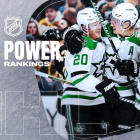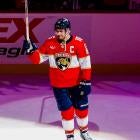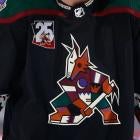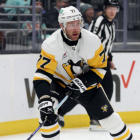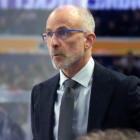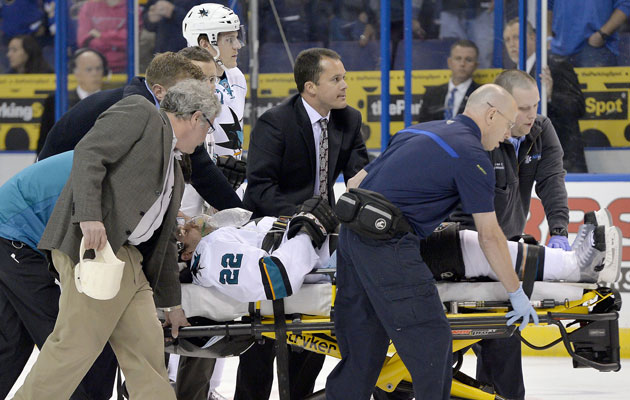
More NHL: Scores | Standings | League Leaders | Odds | Injuries | Power Rankings
Despite the fact that it is the direction the player safety discussion inevitably always turns, fighting is not the biggest issue the NHL needs to address to keep its players safe. It's the hitting.
Just as fighting supporters will ardently tell you about fisticuffs, hitting is part of the game. While the former might change some day, the latter will not and frankly it shouldn't. So before we go any further don't misread this asking for a banishment of hitting. The aim is to seek the banishment of bad hitting. You know, the ones that are illegal? Something needs to be done to get the bad hitting out of hockey because nothing has seemed to work up until now.
While sights like George Parros going down in a fight on opening night have popped up, the more common occurrences have been situations similar to what happened with Sharks defenseman Dan Boyle on Tuesday night. After playing the puck in the corner boards, the next thing he knew he was being taken off the ice on a stretcher, the result of a vicious hit from behind and into the boards from Maxim Lapierre.
The potential for serious injury is so much greater in hits from behind than it is in fighting. The hockey world has seen time and time again what can happen, the starkest reminder recently being the severe injuries to Minnesota high schooler Jack Jablonski. These devastating hits are part of the game but they need not be anymore.
For some time the league has been doing its best to get the message across but it hasn't been working. Some guys like Matt Cooke really have changed their ways (seriously, Cooke doesn't have a single minute in penalty time in seven games so far). Overall though, too many men are still being called to the office of Brendan Shanahan to try and get the message across. In a perfect world, Shanny would be kicking back drinking Mai Tais every afternoon because his schedule is completely clear.
We're not just limiting the conversation to hits from behind here but also hits to the head. Both of those have been the major foci for the league on trying to make the game safer while not materially changing it. Unfortunately, we still see the repeat offenders. Patrick Kaleta, for example, was just given a 10-game suspension for a hit to the head, the severity of his suspension being largely tied to the fact that he had three suspensions before. Raffi Torres has become a poster boy for suspensions.
While it seems the league offices are trying to increase the penalties for bad hits -- the short-term results this season seem to indicate Shanahan is levying heavier suspensions, a step above veritable slaps on the wrist -- it doesn't appear to be enough because he's still having to levy suspensions. So what can be done to finally get the message across and eradicate the bad and needless hits from the game?
It's not going to be fighting, I'll say that much. The deterring element of dropping the gloves has been there forever in the sport and so have the hits. It's harder to make the argument when you see Lapierre make the type of hit he did on Tuesday night and then get accused of turtling by the Sharks.
"A player that probably shouldn’t even be in the league is taking out one of the best players in the world. That guy's got a history," Sharks forward Logan Couture said after Tuesday night's game. "After the first shift, he's yelling at us from their bench that he's coming after us, and then he does that. I don't even know. It's pretty gutless. Then he turtles. Be a man if you make a hit like that. Don't turtle and run behind the linesman."
If shying away from frontier justice is a viable option, where's the deterring factor? Even still, back in the 80s and 90s there were brutal hits and that's when rosters were littered with guys who could fight. It's not the answer.
While the efforts of Shanahan and crew are to be commended as his office has been as open and informative as possible, maybe it's time they go bigger because the previous approaches haven't seemed to be all that effective. Perhaps the punishments start moving up the chain. Your player delivers a hit worthy of a suspension? Fine the coach, too, maybe even suspended him. While you’re at it, maybe you fine the GM or the organization as a whole.
Fines though haven't always proven to be effective so perhaps you go even deeper, somehow finding a way to hit teams where it really hurts, in an area such as cap space. Just spitballing here but perhaps any suspension that's longer than three games is accompanied with a $100,000 per game hit on next season's cap. Harsh? Absolutely. That's the point. Maybe the organizational pressure would be enough to get the hits out of the game, or at least the serial hitters. If all of a sudden by proxy Kaleta becomes a player with a $2.25 million cap hit instead of $1.25 million, he doesn't look anywhere near as attractive, does he?
Another approach could be to hamper the team's roster. If a player is suspended, the team doesn't get to ice a full roster during his suspension. A forward lands a four-game suspenion? His team then plays four games with 11 forwards instead of 12.
Is that the answer? I don't know, there are plenty of other routes the league could take but so far the simple fines and suspensions haven't been enough. Going beyond the traditional means is necessary, it seems. Handing out tougher and longer suspensions might help but likely not if the track record is considered. The NHL needs to stop making news because of players lying motionless on the ice, good players like Boyle to boot. In this case I'm not sure any news is good news for the league.
You will never be able to ensure the stretchers won't be needed again. Hockey is a very fast, very violent game and accidents will happen. That doesn't mean hits like Lapierre's, where he finished his check from behind on Boyle hard and through the boards, should just be accepted. I don't know of anybody in hockey, whether it be players, coaches or fans, who would argue otherwise.
The question which the league has been trying to answer still needs a solution. Maybe drastic hits call for drastic measures.













